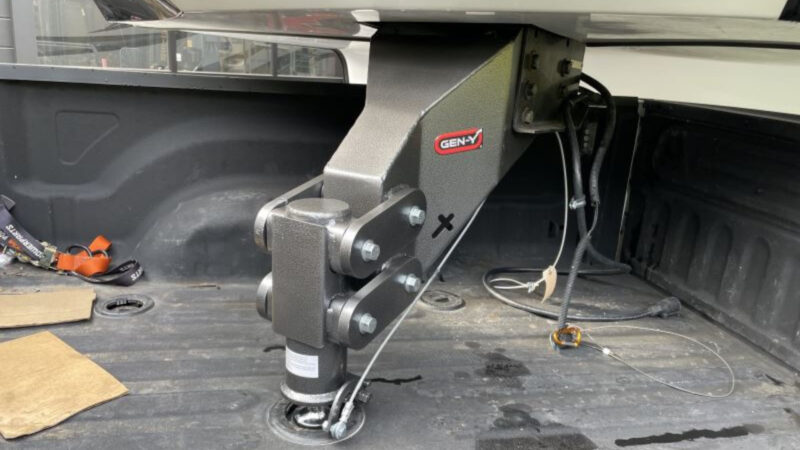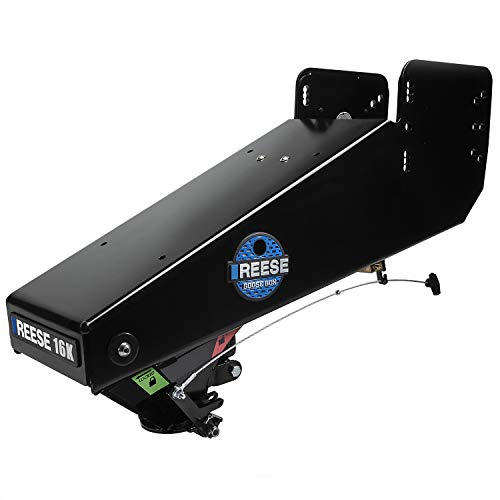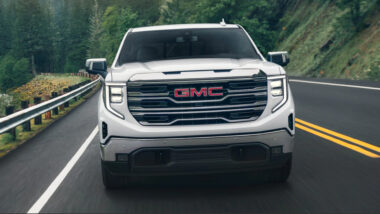Table of Contents Show
If you’ve been camping, you’ve probably seen that travel trailers and fifth wheels have different types of hitches. People tow travel trailers (or bumper pulls) by vehicles with a ball and hitch they attach to the rear bumper.
Sometimes these vehicles can be SUVs or even minivans. However, fifth wheels have special kingpin hitches that attach only to the bed of a truck, securely locking into place.
But did you know there’s another hitch you can use to tow a fifth wheel? It’s a goose box hitch, and some RV owners prefer it over a traditional fifth wheel hitch. Let’s look at goose box hitches and what makes them excellent options for towing!
What is a Goose Box Hitch?
Some RVers want to use a gooseneck hitch. This could be because they have a horse trailer and already use a gooseneck hitch and don’t want to outfit their truck with a different one.
Others prefer towing with a gooseneck hitch instead of a traditional fifth wheel pin box because it takes up less space. Regardless of the reason, a goose box hitch replaces the conventional RV pin box.
Are All Gooseneck Hitches the Same?
All gooseneck hitches aren’t the same. However, their design is similar. A gooseneck hitch mounts into the truck bed and provides a simple trailer ball for connecting a gooseneck trailer. There are a few ways to install the trailer ball.
The traditional method involves installing brackets or rails underneath the truck bed where the trailer ball is. Some manufacturers install a puck system in their trucks. A third option is using existing fifth wheel hitch base rails with a gooseneck adapter.
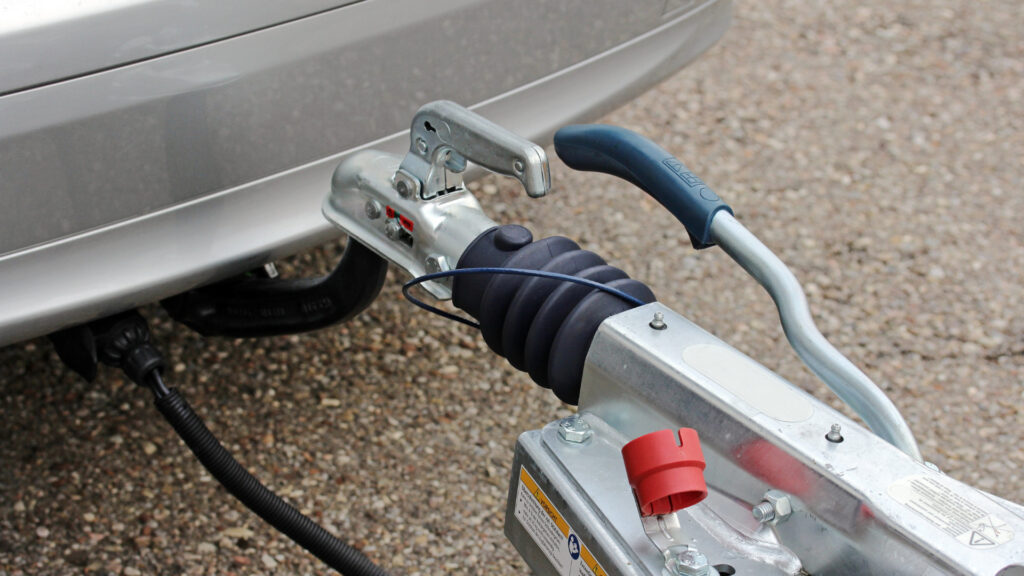
Why Do Goose Neck Trailers Need Safety Chains?
In theory, you should keep the ball and hitch connected at all times. But there’s a slight possibility that the hitch could slip off the ball if you don’t join it correctly.
Safety chains keep the RV attached to the truck should an emergency as a runaway trailer arise. Travel trailers should always have safety chains, too, since they also connect with a ball and hitch.
Goose Box Hitch Buying Guide
When purchasing a goose box hitch, you must first know what towing equipment your truck already has.
You might have a puck system or a tow package with certain features and upgrades. Check first; then, look for a specific design to suit your towing needs.
Size
It’s essential to locate the sticker or plate on the pin box of your trailer to know what size goose box hitch to purchase. Lippert #1621, 1621HD, and 0719 pin boxes are the most common pin boxes people replace.
If you don’t know the part you’re replacing; you’ll want to choose a goose box hitch with the towing and pin weight capacity that meets the GVWR and pin weight of your trailer.
Above-Bed Hitch or Under-Bed Hitch
Above-bed hitches attach to the rails of a truck. If you plan on switching between a fifth wheel hitch and a gooseneck hitch often, this is the best option. It’s easily accessible, and you can switch it out without too much trouble.
On the other hand, under-bed gooseneck hitches are better for owners who want custom-fitted hitches.
These rails attach under the bed of the truck. You can easily remove or lower the ball when you aren’t using it, so you have more space in the truck bed.
Pros of Goose Box Hitch
Both goose box hitches and fifth wheel hitches can tow heavy loads. They’re also exclusively for truck beds and not any other type of vehicle.
But there are pros to installing a goose box hitch instead of a fifth wheel hitch. In addition, when comparing a gooseneck to a standard ball and hitch, there are more benefits.
The Design
A ball in the back of your truck bed is much less invasive than a huge fifth wheel hitch.
You can’t use the bed of your truck for hauling much else. When you aren’t towing a trailer, you can quickly run to Lowe’s or Home Depot and pick up lumber, a large appliance, or furniture if you have a gooseneck ball in the truck bed.
Helps With Towing a Longer Rig
Flatbed trailers can be over 50 feet in length. Travel trailers can reach lengths of 40 feet. A goose box hitch makes towing these vehicles much more accessible than a standard ball and hitch. There’s less sway than you’d experience with a bumper pull trailer connection.
Plus, longer rigs are usually heavier. Most gooseneck hitches have a rating of up to 30,000 pounds. Trucks have a higher payload and towing capacity than most other vehicles. So towing with a goose box hitch in the back of a heavy-duty truck will improve performance and overall towing experience.
Stability
Travel trailers that attach to the rear bumper of a tow vehicle are much less stable than a trailer you connect to the bed of a truck.
This is because a goose box hitch puts weight onto the entire truck axle, providing better stability. It’s also easier to turn since the trailer starts to turn sooner when you attach it to the bed of a truck and not the bumper.
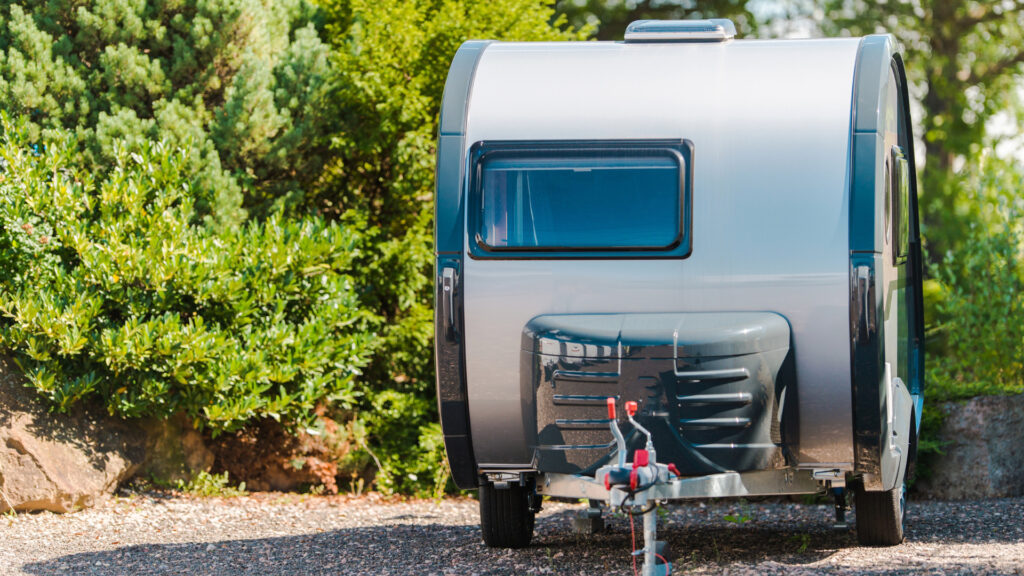
No Heavy Hitch in Your Truck Bed
Compared to a fifth wheel hitch, a gooseneck is much smaller and lighter.
You can use the bed of your truck much easier when you have a small ball instead of a large hitch. It’s also easier to remove a ball instead of a heavy hitch when you’re done camping for the year.
Cons of Goose Box Hitch
Although there are pros to using a goose box hitch over a ball and a fifth wheel hitch, there are also disadvantages.
You always have to use safety chains, it can be pricey, and you’re more likely to be on your own in emergencies.
Need Safety Chains
Safety chains are necessary when using a goose box hitch. RVers who use a traditional fifth wheel hitch don’t need safety chains because the kingpin locks into place.
The added equipment of safety chains and the hassle of ensuring they’re permanently attached is a disadvantage.
Price
When compared to a ball and hitch of a bumper pull trailer, a goose box hitch is more expensive. But it’s not only the equipment that costs more.
You’re likely to pay for modifications to your truck as well. Whether you’re installing an after-market puck system or are drilling rails into the bed of your vehicle, this process adds up financially.
No One Else Can Move Your RV in a Pinch
Finally, if you need your fifth wheel moved, you won’t find many RVers who can help you.
Most fifth wheel owners have the traditional fifth wheel hitch. So if you have truck problems and can’t tow your RV, you might call a towing company rather than a fellow RVer.
Keep in Mind: What’s the difference between a 5th Wheel vs. Gooseneck Coupler? Let’s take a look!
The Best Goose Box Hitches
When you’re ready to purchase your goose box hitch, here are three of the best options.
Depending on your budget and how you want to install the hitch, one may be better for your situation.
Our Pick: Reese Goose Box Fifth Wheel
This Reese goose box hitch comes with 5th Airborne technology to provide a comfortable ride. The airbag, dual shocks, and rubber bumpers offer excellent shock absorption.
Rated for 16,000 pounds, this goose box hitch has a pin weight of up to 3,200 pounds. It can replace Lippert #1621, 1621HD, 0719, and Fabex PB-600 Series fifth wheel pin boxes. It comes with a limited lifetime warranty and costs about $1,800.
- MAXIMUM STRENGTH: Enjoy towing nearly any size fifth wheel trailer without worry thanks to the Goose Box’s robust...
- AIRBAG TECHNOLOGY: Enjoy premium comfort when towing thanks to the Goose Box’s air ride technology. It’s...
Highest Rated: Gen-Y Hitch 5th Wheel to Gooseneck Pin Box
This Gen-Y goose box hitch doesn’t come with airbags, which means less to maintain and repair. Instead, the shock-absorbing technology functions like a torsion axle to limit the transfer of road shock between the trailer and the truck.
With a rating of 21,000 pounds, this goose box hitch has a pin weight capacity of 1,500-3,500 pounds. It can replace Lippert #1621 and 1621HD fifth wheel pin boxes and has a 5-year limited warranty. It costs about $1,500.
Budget Friendly: Gen-Y Hitch Shock Absorbing 5th Wheel to Gooseneck Pin Box
Another Gen-Y goose box hitch is the least expensive option on the list. It doesn’t have airbags and can replace Lippert #1621 and 1621HD fifth wheel pin boxes like the previous model.
The shock-absorbing technology reduces chucking and limits jarring. Rated for 18,000 pounds, it has a pin weight capacity of 1,000-2,000 pounds. This goose box hitch comes with a 5-year limited warranty and costs about $1,200.
Keep in Mind: If you have a vehicle that has a hitch, Should You be Putting Grease on Your Trailer Hitch Ball?
Tow Your Fifth Wheel Worry-Free with a Goose Box Hitch
If you want to use the bed of your truck to haul things other than your fifth wheel, flatbed trailer, or horse trailer, consider a goose box hitch.
The smaller ball will give you plenty of room to tote around other items than the traditional fifth wheel hitch. In addition, a goose box hitch will provide more stability than a ball and hitch attached to your rear bumper.
After considering the pros and cons, will you tow your fifth wheel with a goose box hitch soon?
Last update on 2025-01-19 / Affiliate links / Images from Amazon Product Advertising API




